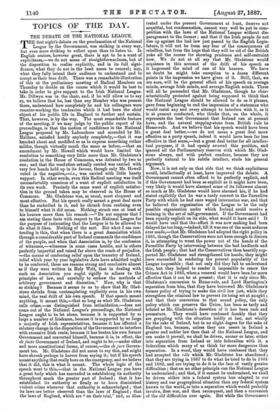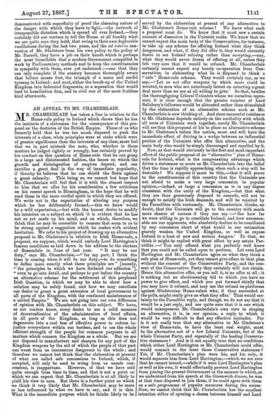TOPICS OF THE DAY.
THE DEBATE ON THE NATIONAL LEAGUE.
THE first night's debate on the proclamation of the National League by the Government, was striking in every way, but even more striking to reflect upon than to listen to. In English orators, however great, there is apt to be a want of explicitness,—we do not mean of straightforwardness, but of the disposition to realise explicitly, and in its full signi- ficance, what they do not in the least mean to conceal; nay, what they fully intend their audience to understand and to accept as their true drift. There was a remarkable illustration of this at the preliminary meeting of Radical Members on Thursday to decide on the course which it would be best to take in order to give support to the Irish National League. Mr. Dillwyn was in the chair, and, if he will allow us to say so, we believe that he, less than any Member who was present there, understood how completely he and his colleagues were counter-working the tendencies which it had been the chief object of his public life in England to further and sustain. That, however, is by the way. The moat remarkable feature of the meeting, if we may judge by the public report of its proceedings, is that the motion of confidence in the National League proposed by Mr. Labonchere and seconded by Mr. Haldane, satisfied hardly anybody completely,—that it was knocked about and modified so as to express something rather milder, though virtually much the same as before,—that an amendment by Mr. Howell which would have limited the resolution to something very little more than Mr. Gladstone's resolution in the House of Commons, was defeated by two to one; and that the resolution actually carried was carried with very few hands held up in its favour, though only Mr. Howell voted in the negative,—i.e., was carried with little hearty support. In other words, even this Radical meeting was itself uncomfortably conscious of a want of explicit satisfaction in its own work. Precisely the same want of explicit satisfac- tion in the ground taken may be observed in the House of Commons. Mr. Gladstone was, as usual, most eloquent and most effective. But his speech really meant a great deal more than he embodied in it, and he shrank from realising even to himself what it did mean. Nothing struck one at least of his hearers more than his remark :—" Do not suppose that I am stating these facts with respect to the National League for the purpose of insinuating that the League is to be allowed to do what it likes. Nothing of the sort. But what I am con- tending is this, that when there is a great Association which through a considerable part of Ireland commands the confidence of the people, and when that Association is, by the confession of witnesses,—witnesses in some cases hostile, and in others perfectly impartial and raised far above the reach of prejudice, —the means of conferring relief upon the tenantry of Ireland, relief which year by year legislative Acts have admitted ought to be conferred, these are reasons strong and conclusive almost as if they were written in Holy Writ, that in dealing with such an Association you ought rigidly to adhere to the principles of law, and carefully to eschew the methods of arbitrary government and discretion." Now, why is that so striking f Because it seems to us to show that Mr. Glad- stone shrinks from contemplating explicitly even in his own mind, the real drift of his own speech. If that speech meant anything, it meant this,—that so long as what Mr. Gladstone calls crime,—as distinguished from intimidation,—does not come out of the National League's proceedings, the National League ought to be let alone, because it is supported by so large a number of Irishmen, because it is supported by so large a majority of Irish representatives, because it has effected a salutary change in the disposition of the Government to interfere with excessive Irish rents, because it has beaten his own former Government and converted himself, because it is, in effect, the de facto Government of Ireland, and ought to be,—under other and more constitutional forms, of course,—the de jure Govern- ment too. Mr. Gladstone did not mean to say this, and might have shrunk perhaps in horror from saying it; but if his speech meant anything that really bore on the emergency, and we believe that it did, this is what it meant. The whole logic of the speech went to this,—that in the National League you have a great body which has succeeded in establishing its authority throughout much the greater part of Ireland ; that it has established its authority so firmly as to have diminished violent crime wherever that authority is acknowledged ; that its laws are better observed than the laws of England ; that the laws of England, which are " on their trial," and, as illus-
trated under the present Government at least, deserve not acquittal, but condemnation, cannot very well be put in com-
petition with the laws of the National League without dis-
paragement to the former; and that if the Irish people do not rise up against the bad law just passed by the English Legis- lature, it will not be from any fear of the consequences of rebellion, but from the hope that they will be rid of the British yoke all the sooner for showing prudence and self-restraint now. We do not at all say that Mr. Gladstone would acquiesce in this account of the drift of his speech as it impressed the mind of one of his hearers. We have no doubt he might take exception to a dozen different points in the impression we have given of it. Still, that, we are sure, will be the general effect of his speech on average minds, average Irish minds, and average English minds. These will all be persuaded that Mr. Gladstone, though he char- acteristically protested against being supposed to think that the National League should be allowed to do as it pleases, gave from beginning to end the impression of a statesman who would resist any and every attempt to interfere with it, as it is at present conducted, who thinks that, on the whole, it represents the best Government that Ireland can at present have, and the natural stepping-stone from British rule to Home-rule. And we believe that his speech would have been a great deal better,—we do not mean a great deal more effective as a party speech, indeed it would have been far less effective in that sense,—but a great deal better for all intellec- tual purposes, if it had openly avowed this position, and ignored all the Parliamentary reserves with which Mr. Glad- stone always, and with perfect candour, because they are perfectly natural to his subtle intellect, studs his general argument.
Now, it is not only on that side that we think explicitness would, intellectually at least, have improved the debate. A Government cannot often afford to be perfectly explicit, and if this Government had been as explicit as it might have been, very likely it would have alarmed some of its followers almost as mach as Mr. Gladstone would have alarmed his, if he had stated explicitly that he was a tardy convert to the Parnellite Party with which he had once waged internecine war, and that he believed the organisation of the League to be the only possible organisation under which Ireland could receive a training in the art of self-government. If the Government had been equally explicit on its side, what would it have said ? It would have said that the effort it was now making had been delayed far too long,—indeed, till it was one of the moat arduous ever made,—that Mr. Gladstone had adopted the right policy in 1881, though the Conservatives were not keen enough to discern it, in attempting to wrest the power out of the hands of the Parnellite Party by intervening between the bad landlords and the Irish people ; that had the Conservatives then heartily sup- ported Mr. Gladstone and strengthened his hands, they might have succeeded in rendering the present popularity of the League impossible ; that not only did they fail to understand this, but they helped to render it impossible to renew the Crimes Act in 1885, when a renewal would have been far more effective than it can be at present ; that it is only since Mr. Gladstone's conversion to Home-rule, and Lord Hartington's separation from him, that they have borrowed Mr. Gladstone's former policy of trying to make the civil law just, while they strengthen the criminal law to prevent its being set at naught ; and that their conversion to that sound policy, the only policy which can preserve the Union, has been as tardy and belated as Mr. Gladstone's desertion of it has been rash and premature. They would have confessed frankly that they are grappling with the situation boldly at last, not wholly for the sake of Ireland, but in no slight degree for the sake of England too, because, unless they can assert in Ireland a greater and nobler law than that of the National League, and can make it prevail, we shall be driven, sooner or later, either into separation from Ireland or into federalism with it, a federalism which many of us think far more dangerous than separation. In a word, they would have confessed that they had accepted the role which Mr. Gladstone has abandoned ; that they are trying in 1887 to do what he tried to do in 1881 and 1882, and are trying to do it in the face of vastly greater difficulties ; that on no other principle can the National League be undermined ; and that, if it cannot be undermined, we shall be driven either into a federal system less adapted to our history and our geographical situation than any federal system known to the world, or into a separation which would probably involve, first war, and then reconquest, and then a succession of the old difficulties over again. But while the Government demonstrated with superfluity of proof the alarming nature of the danger with which they have to fight,—the network of irresponsible dictation which is spread all over Ireland,—they certainly did not venture to tell the House at all frankly what we are quite sure they hold, that owing to their own deplorable vacillations during the last two years, and the ad interim con- version of Mr. Gladstone from his own policy to the policy of Mr. Parnell, they have a job on their hands which is perhaps the most formidable that a modem Government compelled to work by Parliamentary methods and to keep the constituencies in sympathy with them, ever yet undertook ;—one that they can only complete if the country becomes thoroughly aware that failure means first, the triumph of a mean and sordid tyranny in Ireland ; and next, either the break-up of the United Kingdom into federated fragments, or a separation that would lead to humiliation first, and to civil war of the most fruitless kind afterwards.



































 Previous page
Previous page